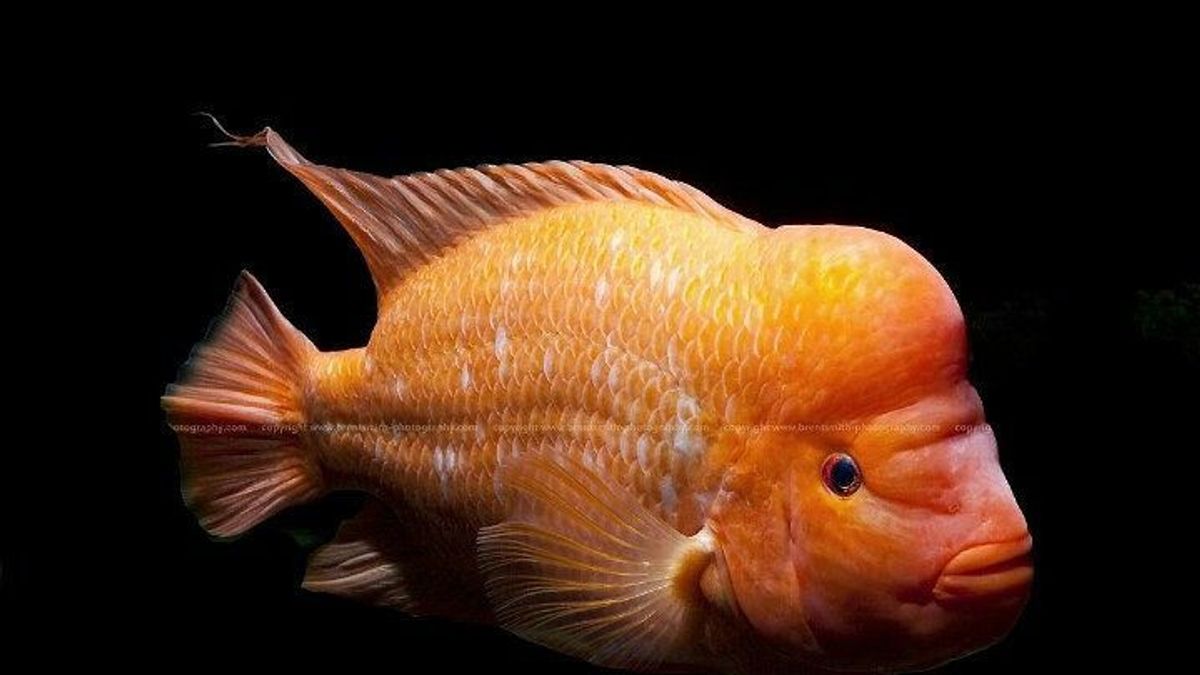YOGYAKARTA - The Red Devil Fish, or known as the scientific name Amphilophus labiatus, is one of the species of predatory fish that is well known among aquarium lovers. This fish has an attractive body with a striking red, orange, to yellow color, making it a preferred choice for ornamental fish fans. However, many may not recognize the origin of the Red Devil fish and its unique and distinctive features are different from other ornamental fish. This article will explore the history as well as the origins of the Red Devil fish and the characteristics and uniqueness of the Red Devil fish owned by this species.
The origin of the Red Devil fish can be traced to the Central American region, especially in large lakes located in Nicaragua and Costa Rica. These fish live in freshwater waters in lakes such as Lake Managua, Lake Xiloa, and Lake Nicaragua. In their natural habitat, Red Devil is an aggressive predator that lives in water areas with rocks and sand substrates. The characteristics of this area function importantly in shaping the strong behavior and durability of Red Devil.
SEE ALSO:
The lake area in Nicaragua is known to have diverse endemic cichlid species, and Red Devil is one of them. The arrival of this fish in the wild shows its important role in protecting the balance of the lake ecosystem. As a predator, the Red Devil fish prey on small fish and the surrounding invertebrates, thus helping to control the population of other small animals.
Red Devil Fish Characteristics
Red Devil fish have a strong body and a unique shape. Not only is this striking red color dominating its body, this fish can also be orange or yellow, with dark spots or black spots on some parts of the body. This fish has thick and large lips, and a round head with a bulge or "nuchal hump" that appears as an adult, especially in males. These thick lips support Red Devil when searching in its rocky natural habitat.
In size, Red Devil fish are large in category for aquarium fish. In the wild, this fish can grow to reach a length of approximately 30 centimeters. While in aquariums, they usually grow up to about 20 25 centimeters, depending on the circumstances and the care provided. Red Devil's abusive behavior is also one of its main characteristics. These fish tend to be territorial and can attack other fish that enter their territory, even sometimes digging for substrates or destroying aquarium decorations.
Red Devil's Journey To Become Ornamental Fish
Although its natural habitat in Central America, Red Devil fish are becoming known in various parts of the world as ornamental fish. Its popularity among aquarium lovers began in the mid-20th century, when many people were attracted to large cichlid species with a unique personality and striking colors. The origin of the exotic Red Devil fish from Nicaragua waters made it a special attraction for ornamental fish hobbyists.
However, because of its aggressive nature, Red Devil is not a fish that is easy to maintain in community aquariums. Maintenance requires large aquariums, at least 200 liters or more, and stable water conditions. This fish is generally more suitable to be kept alone or with other species that have the same size and aggressive character.
The Impact of Red Devil on the Ecosystem
Not only being a favorite among ornamental fish lovers, but Red Devil also has the potential to become an invasive species if it is released into an environment that is not supposed to be. In some places, such as subtropical and tropical waters outside Central America, this fish can pose a threat to local ecosystems because of its aggressive nature and ability to compete with native species.
In its natural habitat, the origin of the Red Devil fish that live in Nicaragua lakes makes it accustomed to special ecosystems. However, if released into other waters, the Red Devil could damage the original fish population, threaten biodiversity, and disrupt ecosystem balance.
Talking about the Red Devil fish, you need to know what Invasive Fish is prohibited from being kept in Indonesia and the Punishment for Violating.
So after knowing the origin of the redvil fish, see other interesting news on VOI.ID, it's time to revolutionize news!
The English, Chinese, Japanese, Arabic, and French versions are automatically generated by the AI. So there may still be inaccuracies in translating, please always see Indonesian as our main language. (system supported by DigitalSiber.id)


















